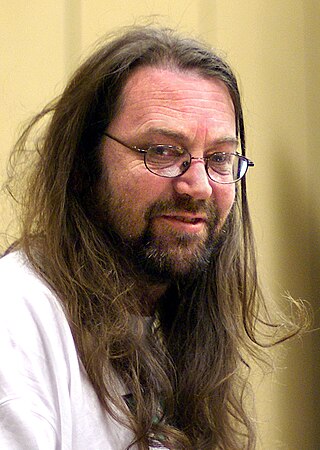
Jeff Minter is an English video game designer and programmer who often goes by the name Yak. He is the founder of software house Llamasoft and has created dozens of games during his career, which began in 1981 with games for the ZX80. Minter's games are shoot 'em ups which contain titular or in-game references demonstrating his fondness of ruminants. Many of his programs also feature something of a psychedelic element, as in some of the earliest "light synthesizer" programs including Trip-a-Tron.
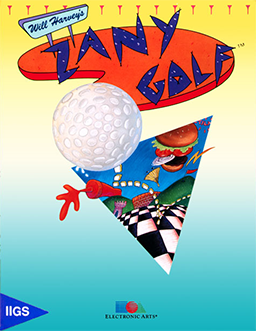
Zany Golf, also known as Will Harvey's Zany Golf, is a fantasy take on miniature golf developed by Sandcastle Productions and published by Electronic Arts in 1988. The game was originally written for the Apple IIGS and subsequently ported to the Amiga, Atari ST, and MS-DOS compatible operating systems. In 1990, a port was released for the Sega Genesis. The game was developed by Will Harvey, Ian Gooding, Jim Nitchals, and Douglas Fulton. Harvey was pursuing his advanced degrees at Stanford University at the time.

Llamatron is a multidirectional shooter video game programmed by Jeff Minter of Llamasoft and released in 1991 for the Atari ST and Amiga and in 1992 for MS-DOS. Based on Robotron: 2084, players of Llamatron control the eponymous creature in an attempt to stop an alien invasion of Earth and rescue animals—referred to as "Beasties"—for points. Players advance by destroying all of the enemies on each level using a laser that fires automatically in the direction that the Llamatron is moving. Various power-ups exist to aid the player in defeating the wide variety of enemies and obstacles they face along the way.
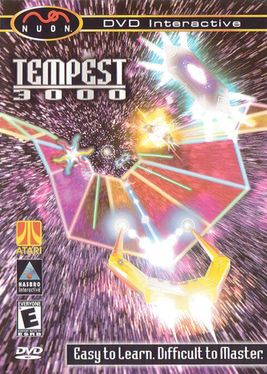
Tempest 3000 is a tube shooter video game developed by Llamasoft for the Nuon. It was published by Hasbro Interactive in North America on December 13, 2000, and Europe on March 2001. It is a follow-up to Tempest 2000, an updated remake of Dave Theurer's arcade game Tempest (1981). The player controls a claw-shaped blaster, shooting at enemies and obstacles, scoring points, and surviving multiple levels. The game modifies and builds upon the gameplay from Tempest 2000, introducing new enemies and mechanics.
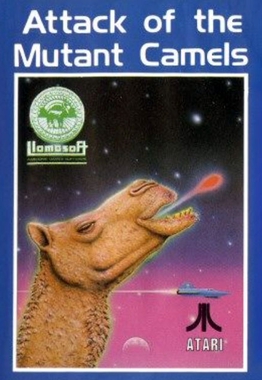
Attack of the Mutant Camels is a surrealist video game written by Jeff Minter and released for the Commodore 64 and Atari 8-bit computers in 1983 by Minter's Llamasoft. The horizontally scrolling shooter is similar to the Atari 2600 game The Empire Strikes Back (1982), with AT-AT walkers replaced by giant camels. Confusingly, a very different game from Jeff Minter's Gridrunner series was also released in the US under the name Attack of the Mutant Camels.

Gridrunner++ is a shoot 'em up written by Jeff Minter for Pocket PC, then for Windows. It has since been ported to Mac OS X and iOS. It was only available as shareware for download from the Llamasoft website, with a registration fee of £5. It was followed-up by Gridrunner Revolution (2009) and Gridrunner iOS (2012).
Butts Up or Wall Ball is a North American elementary school children's playground game originating in the 1950s or earlier.. It is slightly similar to the game Screen Ball, and began in the 1940s or 1950s as a penalty phase of various city street games. Butts Up is played with a ball on a paved surface against a wall, with a variable number of participants—usually more than three and often likely to exceed ten. Butts Up tends to be played during recess, before or after school.. Popular in New England is another frequent variation of wall ball that usually differs a lot from the more widely known 'Butts Up'.
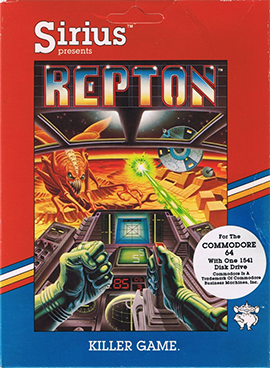
Repton is a Defender-inspired scrolling shooter written by Dan Thompson and Andy Kaluzniacki for the Apple II and published by Sirius Software in 1983. It was ported to the Atari 8-bit computers, and Commodore 64.

Hover Bovver is a 1983 maze video game written by Jeff Minter released for the Commodore 64. A port to Atari 8-bit computers by Aaron Liddiment followed in 1984. Like many of Minter's other games, it has an offbeat sense of humour. The background music is based on the folk tune "Country Gardens" by Percy Grainger, arranged by James Lisney.
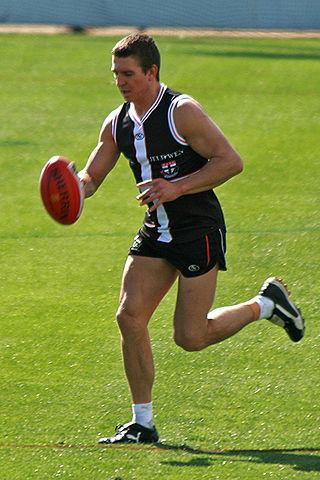
A running bounce, or simply bounce, is a skill in the sport of Australian rules football and some variants where a player bounces the ball on the ground in order to run more than the maximum distance with the ball.
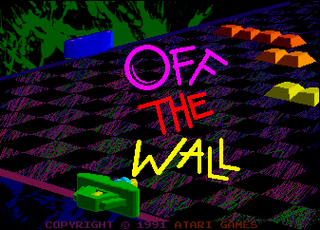
Off the Wall is an arcade game produced by Atari Games and released in North America in 1991. A remake of Breakout, it has a much wider variety of gameplay elements of the original. Most notably, it models spin on the ball. Off the Wall supports up to three players simultaneously. The game's graphics include many backgrounds modeled after modern abstract art. In spite of the identical title, this is a different game from the 1989 Atari 2600 cartridge release.
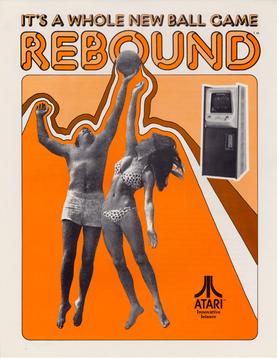
Rebound is a two-player sports arcade video game developed by Atari and released in February 1974. In the game, two players each control paddles on either side of a volleyball net, with a ball dropped from the top of the screen. The players bounce the ball back and forth across the net with the goal of scoring points by having the ball reach the bottom or side of the other player's half of the screen, with the trajectory of the ball dependent on where it strikes the paddle. The winner is the first player to reach eleven or fifteen points, depending on the game settings.

Gridrunner is a fixed shooter video game written by Jeff Minter and published by Llamasoft for the VIC-20 in 1982. It was ported to the Atari 8-bit computers, ZX Spectrum, Commodore 64, Commodore PET and Dragon 32. Many remakes and sequels have followed, including versions for the Atari ST, Amiga, Pocket PC, Microsoft Windows, and iOS.
Gridrunner Revolution is an action game developed by Llamasoft for Windows. It was released on 25 September 2009. Llamasoft released an updated version with integrated online scoreboards in December of the same year. The game was made available to buy on Steam in February 2010.

Sheep in Space is a video game written by Jeff Minter for the Commodore 64 and published in 1984 by Llamasoft. It is a horizontally scrolling shooter which borrows gameplay from Defender re-themed to involve sheep. The title screen features an arrangement of Bach's "Sheep May Safely Graze" by pianist James Lisney.

Minotron: 2112 is a multidirectional shooter for iOS written by Jeff Minter and Ivan Zorzin of Llamasoft. It is a mobile remake of Llamatron for the Atari ST and Amiga, which itself is an updated version of the 1982 arcade game Robotron: 2084. It is the Minotaur Project game representing the Mattel Intellivision.

Solar Minotaur Rescue Frenzy, shortened to Minotaur Rescue for the iOS App Store, is a multidirectional shooter for iOS developed by Jeff Minter and Ivan Zorzin of Llamasoft and released in January 2011. It was Llamasoft's first iOS game. On the iPhone, the game supports up to two players at the same time. On an iPad, it supports up to four.

GoatUp is a platform game for iOS developed by Jeff Minter and Ivan Zorzin of Llamasoft and published via the App Store in 2011. It is the first platform game from Llamasoft. According to Minter, the three main influences were Canyon Climber and Miner 2049er for the Atari 8-bit computers and a homebrew Atari 2600 game called Man Goes Down. It is the Minotaur Project game representing the ZX Spectrum.

GoatUp 2 is a platform game for iOS developed by Jeff Minter and Ivan Zorzin of Llamasoft and published via the App Store in 2013. It is the only Llamasoft game so far to include a level editor. The title screen gives the game's full name as "Buck! The story of GoatUp 2", a reference to the arcade game Rainbow Islands, and the game's interface and appearance resemble that platform with the exception that the font is the same Namco Galaga font used in Super Ox Wars.

Moose Life is a forward-scrolling shoot 'em up game for Microsoft Windows developed by Llamasoft. Similar to past Llamasoft titles like Tempest 2000 and Polybius, the title incorporates influences from classic arcade games of the early 1980s, along with psychedelic visuals and electronic music to create a trance-like effect. It supports virtual reality using Steam VR and PSVR.


















